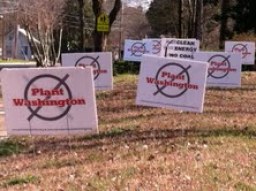FOR IMMEDIATE RELEASE
FROM: FALL-LINE ALLIANCE FOR A CLEAN ENVIRONMENT
DATE: APRIL 14, 2020
CONTACT: KATHERINE CUMMINGS
[email protected]
478.232.8010
LAST PROPOSED COAL PLANT ON FILE IN THE UNITED STATES IS CANCELLED
The Fall-Line Alliance for a Clean Environment (FACE) is proud to announce a permit extension for Plant Washington, a coal-fired power plant proposed to be built in rural Washington County Georgia, has been denied by the Georgia Environmental Protection Division (Georgia EPD). The extension denial invalidates the construction permit and all amendments to the permit are revoked in their entirety. On April 6, 2020, Plant Washington was the only remaining proposed coal plant in the United States to be cancelled.
Announced in mid-January 2008, Plant Washington was heralded by local leaders and plant developer Dean Alford as a fossil-fueled benefit to the local economy. Alford, who is currently indicted for multiple felonies, said that he expected some opposition from environmental groups in Atlanta, which he believed would be tamped down easily. Alford, along with some local leaders, elected officials, and several Electric Membership Cooperatives (EMCs) across the state did not anticipate any opposition from local citizens.
Their assumptions were wrong. A small group of Washington County citizens quickly organized to establish FACE, and quickly began working with state, regional, and national organizations to hold community meetings, table at festivals, speak at state and federal hearings, and testify in court proceedings. FACE worked closely with the Southern Environmental Law Center, Georgia Sierra Club, Altamaha Riverkeeper, Ogeechee Riverkeeper, Justine Thompson Cowan, former director of GreenLaw, and the Southern Alliance for Clean Energy.
Together with its partners, FACE worked diligently for more than 12 years to protect the natural resources, community health, and budgets of Washington County families from the financial boondoggle Plant Washington posed. While the coal plant developer searched futilely for customers, other partner EMCs withdrew their funding and support. In the same time period Azalea Solar Project was constructed and began operating just a few miles from the proposed coal plant site. Cobb EMC, the electric co-op which once fully backed Plant Washington with $13M dollars of its owner’s money, purchases all of the solar project’s electricity.
Despite studies and analysis provided by financial and energy experts refuting the need for the plant, Washington County residents sold or signed away their homes and land rights. Earlier this year a Washington County bank placed legal ads concerning loan defaults for land where the coal plant was supposed to be built. Last year’s property taxes on the land are still unpaid.
The Georgia EPD’s cancellation of the permits is the final death-blow to this no-bid, antiquated project. On behalf of the FACE Board of Directors, Katherine Cummings said, “FACE is deeply appreciative of the critical work our partners contributed towards defeating the country’s last proposed coal plant on the books. The ability to produce clean renewable energy right here in Washington County is further proof that dirty, outdated power generation does not make fiscal or environmental sense. Together with our allies, FACE remains committed to protecting the natural resources and health of our community.”
























 ups.”
ups.” 